No two people feel the same exact way about any film. Thus, Team Experience is pairing up to debate the merits of each of the big awards season movies this year. Here’s Nathaniel R and Cláudio Alves getting shipwrecked...
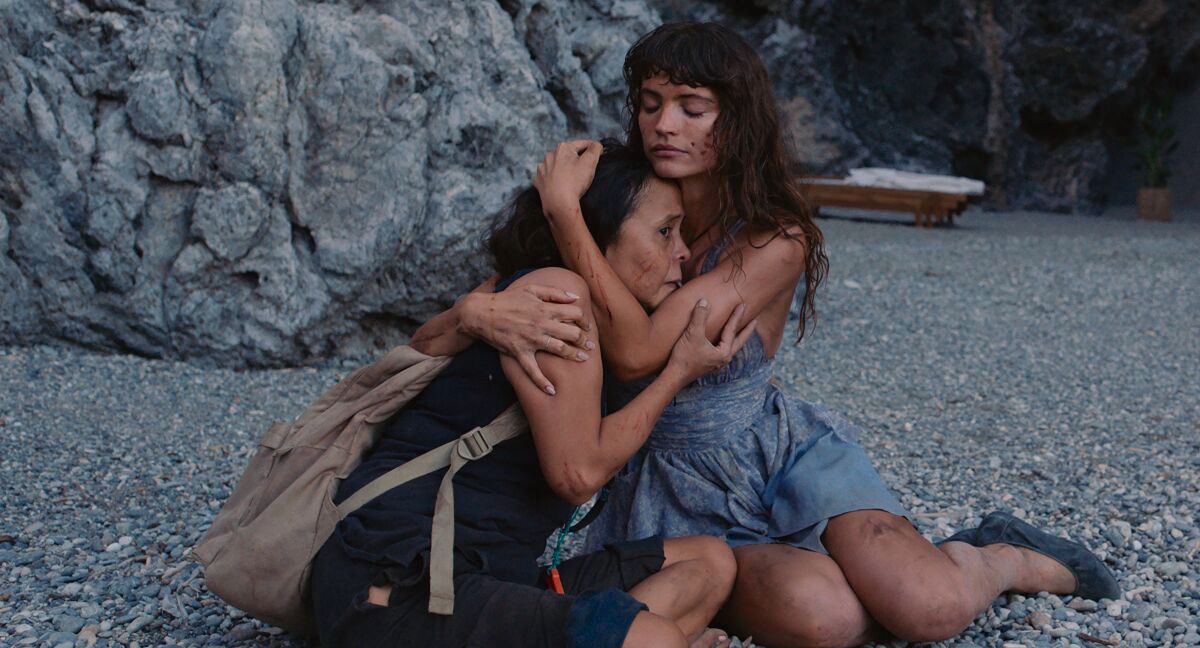
CLÁUDIO: Like many international cinephiles, my first encounter with the work of Swedish director Ruben Östlund was his 2014's breakthrough hit Force Majeure. Unlike others, however, I was mildly disappointed by what I encountered. Don't get me wrong, the main set piece that ignites the narrative's conflicts is astounding, the acting marvelous, and the staging coldly precise. My main issue was with the screenplay, which I found to be shallower than the film's reputation suggested, smugly superior, inflated with airs of self-importance without much to show for it. Comparisons to the similarly structured The Loneliest Planet didn't help, though I admit I might be one of the only ardent fans of that Julia Loktev picture.
In any case, I found myself excited by Östlund's potential, hoping to be dazzled by subsequent efforts now that he seemed poised to become one of Europe's most acclaimed filmmakers. But, sadly, such miracles did not come to pass. Not for me, at the very least…

I've previously elaborated on my issues with The Square, so I won't belabor the point. Once again, there's much to love about the presentation but little to bite into. The project's purported depth felt illusory, masking facile ideas with easy provocations that came off as more comforting for a particular type of highbrow audience rather than genuinely challenging. Still, many people I admire and whose opinion I respect love that picture, and he did win the Palme d'Or, so I must again recognize myself in the minority. Personal hopes started to dwindle, though discovering some of his earlier shorts proved fruitful. Maybe I wasn't totally allergic to Östlund after all. Well, Triangle of Sadness puts an end to any doubts, leaving me with one sad conclusion – this director's cinema isn't for me.
From what I've read, I believe you share an opposite reaction to mine and count yourself among the filmmaker's fans, not to mention a Triangle of Sadness admirer. Isn't that right, Nathaniel?
NATHANIEL: Guilty. Ruben Östlund is definitely "cinema for me" since you put it that way first. In fact, Force Majeure is one of the only DVD jackets (remember DVDs?) that has a Film Experience blurb on it so, yes, I was a fan and remain so. It's interesting that you found it so lacking in comparison to The Loneliest Planet since I hadn't ever really thought of the two side by side but it's true that they have a twin-like structure and a similar theme. But you can love both movies, Cláudio! (I tease. I know you know this). I think they're both wonderful but they are taking very different approaches, one moody and dramatic and the other chatty and satiric.
I don't, however, think you are "in the minority" about Östlund. Or, at least it's a pretty sizeable minority. Two Palme D'Or wins by the age of 48 is a lot to live up to (and, yes, too much: EO and Decision to Leave were right there, after all, and those masters hadn't won Cannes before. I also like The Square but it also had stellar competition so Cannes has been generous with him). I know people take offense when anyone suggests that outside factors influence their opinions but it's the same no matter the artform whether you're talking Oscars, Tonys, Insert-Any-Prize, Pulitzers, or Palms. The more anything is showered with hosannas, the more likely people are to feel defensive or disappointed when they experience it for themselves and don't love it -- basic human nature.
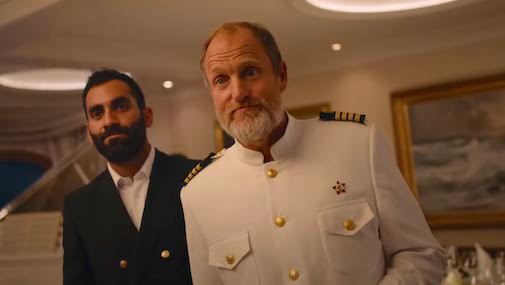
I've heard this "smugly superior" complaint a few times so I want to start there. I get where that's coming from -- Ostlund, like many lauded auteurs, is confident enough in his filmmaking that it sometimes reads as swagger -- but I disagree. I think the movie is pretty merciless in its targets. It keeps getting described as an "eat the rich" satire and while it's true that the 1% come off the worst, I don't think it paints a rosy picture of the merely well off or working class either. Glenn Kenny recently wrote on twitter:
The thing about “Triangle of Sadness” is that it is the most bourgeois idea of a satire: flip, facile disdain for the rich and wannabe rich on one hand, sniveling, visceral fear and disgust for the underclass on the other. Østlund considers himself “just right.”
If you cherry pick a few characters to think about this would be true but you have to cherry pick characters which isn't fair. And the takeaway is confusing to me. The closest we have to an Östlund proxy in the movie, I'd wager, is the captain of the ship (Woody Harrelson). He is hardly heroic or someone to feel great about in any sense. He excorciates himself for being a bad socialist and he's a narcissist, misanthrope, and messy drunk, too! All that said I admit it's weird to use the Woody character as a defense of the film since I think he's the least interesting character.
CLÁUDIO: At least we agree that Harrelson's captain is the least interesting character. Honestly, the whole American socialist vs. Russian capitalist bit felt unbearably stretched out.
That said, we don't need to cherry-pick since all the characters are similar, as if uniformly created to be the means of a punch line rather than human beings. This became impossible to ignore when Zlatko Buric bypassed genuine grief in the aftermath of the shipwreck. The idea of the Russian industrialist denuding his dead sister of jewelry comes off as a fixed point of cartoonish inhumanity that couldn't be contradicted by any complication, neither at the text, framing, or performance level. For all that the picture purports to challenge us, it spoon-feeds its conclusions about the characters and what they represent to the spectator without leaving any leeway for divergent interpretation or complex reaction – an insular viewing experience that’s too toothless to be an effective provocation.
I mention the industrialist, but his gold-vomiting sibling is as much of a caricature, only existing as the vehicle for gross-out humor. She's the grotesque center for a humiliation circus that, like all things in Triangle of Sadness, goes on for too long. The arms-dealing old couple is another feckless punchline, and poor stroked-out Therese embodies the film's most uncomfortable joke made comfortable by vicious repetition.
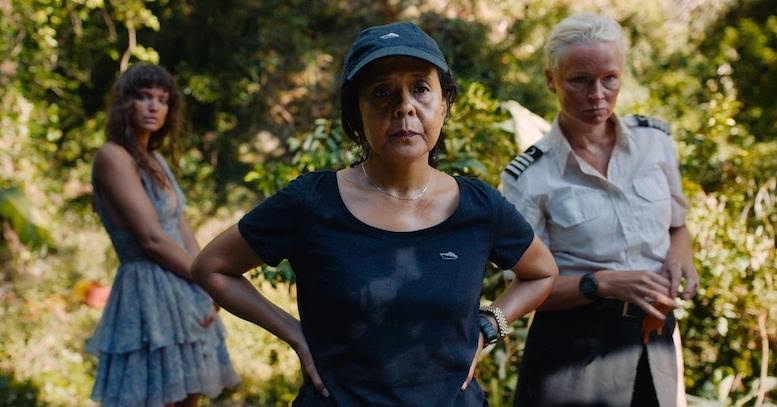
Despite this, my biggest gripes concern the three most-developed individuals and those who can easily be called the movie's stand-out performances. Why is Triangle of Sadness so quick to frame Yaya through her not-boyfriend's judgmental gaze but never allow her the benefit of her own judgment? Why is he so often posited as our avatar into the story, the closest thing to a protagonist? Why does Abigail only exist when she's a figure in charge, barely appearing when she's a worker? I get the idea that you only see her front and center when the rich are forced to acknowledge her, but I find the exclusive alignment of the camera to their experience to be troublesome.
Abigail's invisibility until she becomes the privileged party proves Kenny's Tweet right. For all that Östlund's output contemplates the upper classes' sins, it's incapable or unwilling to imagine the lives of the underclasses. All that remains is a sense of pity cum terror toward the powerless, a perennially incurious cinema.
NATHANIEL: Apologies that it took me so long to respond. But we disagree so emphatically that I didn't know what kind of life raft we could both cling to as the ship went down or what sustenance we could share on the island to continue this conversation?
For instance, I don't buy the argument that the characters are all too similar (what about that sweet hapless dateless gazillionaire?) or that there are no contradictions to their inhumanity. There are plentiful moments where you see sides of characters that you wouldn't find if they were meant only as punchlines. I dont even agree about the scene you're referring to. It's part of the punchline with Dimitry (Zlatko Buric) that money will still take precedence regardless of the emotion but there has to be emotion for that to work and he is visibly feeling it… just before he robs her. Plus he's got a full personality. He's comically quick to adapt to the new hierarchy on the island, and he's also the friendliest person on the boat overall. I'm not saying he's a wonderful human being or anything but this isn’t a one-dimensiona characterl. And far more than any of the other 1% on the boat he recognizes his own grotesquerie which I think is a smart twist, to lower the audience’s guard.
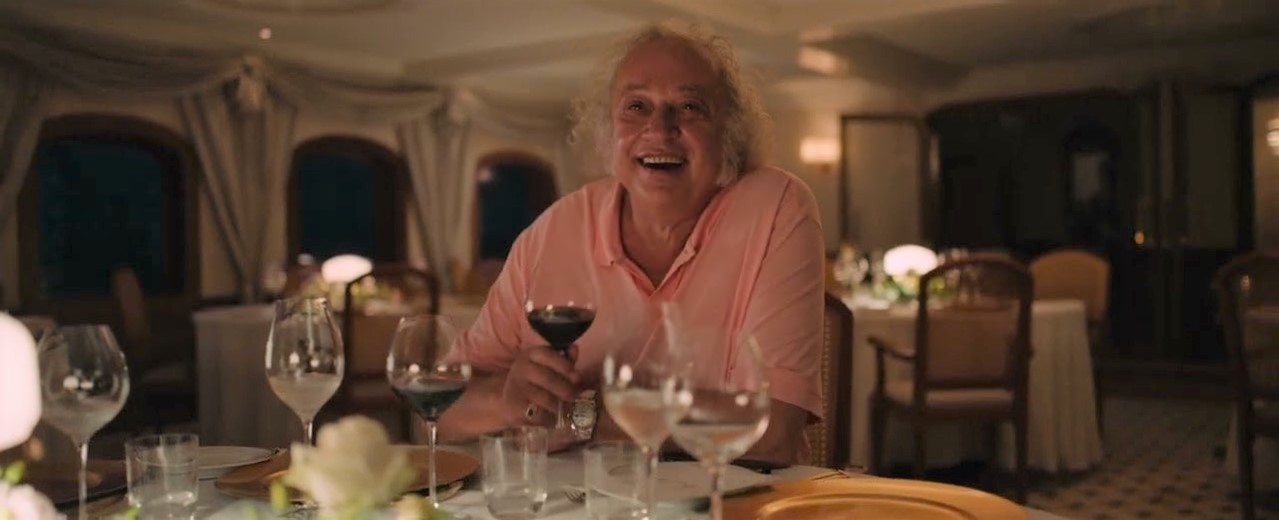
But also, it's a comedy! Of course people are going to be slightly or a lot cartoonish and lean towards the extreme in behavior.
The people who hate this movie get so worked up about it that I also don't buy that it's a "toothless" provocation. Why does it piss people off if it didn't draw blood or make them uncomfortable or think they're being judged as complicit? Even people who like it often reduce it to one topic but the obscenity of wealth is just one of its target. It's not even the first one, really, since the whole first act is a deliciousy spiked cocktail thrown at face cards, gender roles, and performative transactional relationships. I'm not sure i've ever seen a character quite like Carl (Harris Dickinson) centered in a movie before -- and before anyone says "he's a beautiful 20something white man. What the hell are you talking about?" please know that I'm not talking about race or age or beauty. I'm talking about his personality, his desires, his temperament, and especially the way he inhabits his masculinity. He's basically playing the "trophy boyfriend" of someone who is planning to become a "trophy girlfriend" which immediately upends typical gendered notions of income disparity and power dynamics in relationships. What's more, he clearly wants to be the trophy, rather than the (alpha male) provider.
As for Abigail (Dolly DeLeon). On top of De Leon's Oscar-worthy performance, I think people fell hard for the character for idealogical reasons. She's the working class, i.e. the bulk of humanity, and she's funny, so she's easy to root for. But then, what are we actually rooting for once she's "the captain", exactly, given how she herself behaves? It's kind of a merciless joke on Östlund's part, giving us no one we can feel safe around or comfortable about. As for the fact that people don't clock her until she's in charge, I'm sorry but that's on them. I noticed her from the jump. Maybe it's the years I spent in the hospitality industry but she had me giggling with her first lines in the movie, long before she forces herself to the center of the narrative.
Now if you wanted to argue that the movie is misanthropic and thinks we're all pieces of shit deep down, maybe I would just say 'okay, yes, it's really cynical.' And if you want to argue that every scene is too long, than yes. They definitely are. But that's a pandemic in the movies, Östlund being just one of many infected auteurs.
What else can we agree on? Is there anything you did like about it?

CLÁUDIO: Speaking only for myself, the fire behind my wording goes hand-in-hand with the idea of backlash you first brought up. It's not that I dislike the picture BECAUSE it won so many accolades, but its success is vexing when I find it so grotesquely overrated. Is that fair? No. Still, it has nothing to do with Triangle of Sadness secretly being more challenging than I'm allowing myself to believe.
I guess I wouldn't feel as strongly against the thing if I found it particularly funny, but humor is subjective, and I'm not attuned to Östlund's wavelength. Moreover, every solid joke gets dragged down by how overextended the whole thing is. As one who loves long movies and can often be found defending significant running times, I can't begin to defend this one's length. The first act could be a lovely short, but here it feels like an insular prologue. The second is a spiral of spurious repetition, and only the last gets us somewhere with a tighter rhythm or mayhap just a more purposeful distention.
On another matter, you say it's the audience's fault that they don't clock Abigail early, but I beg to differ. Indeed, I was looking for her when first watching the movie, having heard great things about De Leon's performance. She has two appearances of prominence in the second act, walking into the models' room while they're still in bed, and later cleaning the bilious mess of the captain's dinner. We also see her enjoying a fleeting break, but that's mostly an establishing shot. It's a relatively limited way of framing a character who will become one of your de facto protagonists in the story's next passage. While one can't argue against it being a deliberate choice, I disagree with the artistic decision.
Searching for a life raft of agreement between the two of us, I think we share some admiration for the cast. Apart from Harrelson, I was won over by the ensemble work and found my reservations toward some cast members more closely tied to direction than acting. Dolly De Leon is the MVP, playing the whole "absolute power corrupts absolutely" shtick with enough gusto to make one engrossed in its resolution. Harris Dickinson and Charlbi Dean deserve applause for sustaining that quasi-prologue. I was also into what Vicki Berlin was doing as Chief Stew Paula, both within the rigid order aboard and the new rules ashore.
There's still more to appreciate beyond the acting. For all my grumblings against Ruben Östlund, his formal rigor demands respect in a cinematic landscape where few comedy filmmakers seem to care about aesthetics, shot composition, or basic audiovisual storytelling.
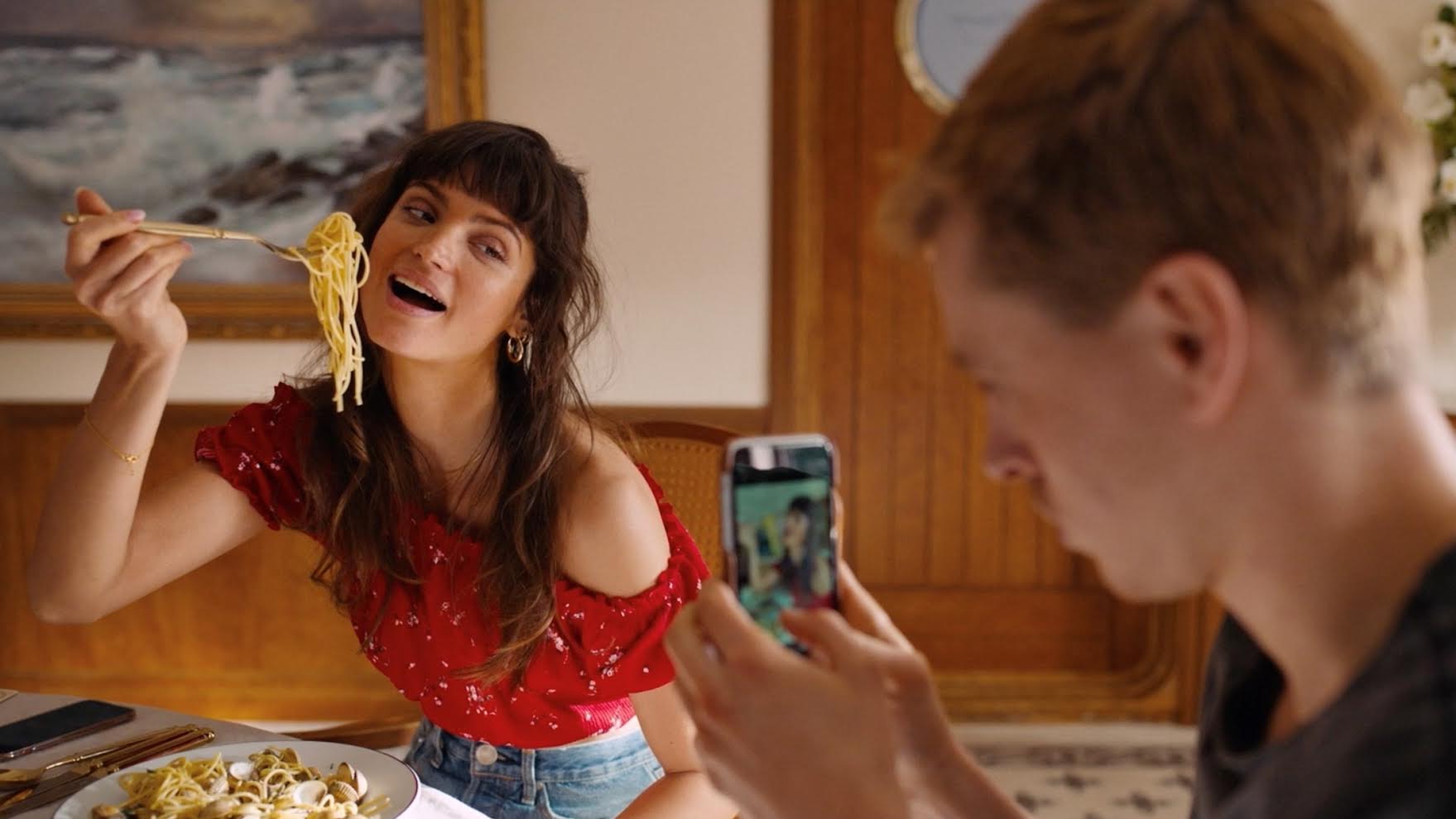
NATHANIEL: Okay, well, then. We do have some common ground in terms of the filmmaking. But maybe our middle ground, since the film is in my top ten list and near the bottom of yours, is actually TFE friend Nick Davis who is in the middle'ish with it, and wrote on Letterboxd:
The best scenes really clicked for me, as did Östlund's total conviction about his message. That said, it's all a little distended and obvious, and not too far from what you'd get if you gently folded together big chunks of Next Floor and Swept Away and baked in a deep-dish pan at about 450°. Woody and Zlatko were a good team. So were Charlbi and Harris. And Dolly and Vicki know a lot about their characters.
Before we go, let's talk Oscar and survivalism.
How well do you think it will fare at the Oscars?. I vacillated across the month from wildly well to okay... but right now I've settled on one maybe two nominations: Original Screenplay and (maybe) Best Supporting Actress. You?
And would you be able to catch fish or start a fire on a deserted island?
CLÁUDIO: To answer your last question first, I'd die on that island in no time. Seriously, I don't even think I'd be able to get the poor donkey – by the way, what is it with 2022 cinema and donkeys? And why do they all suffer so much? Are they all Jesus metaphors? Did Östlund have a Russian capitalist kill Christ? Maybe that's a query for another time – apologies for the detour and the insanity.
Getting back on track, part of my punditry philosophy is predicated on pessimism. In other words, I'm fully predicting a Triangle of Sadness Best Picture nomination, along with those other categories, three nods overall. I can even argue myself into believing Östlund gets in Director, as horrifying as that is. So, at the end of the day, maybe I'm the hopeless misanthrope among us – not the Swedish auteur.
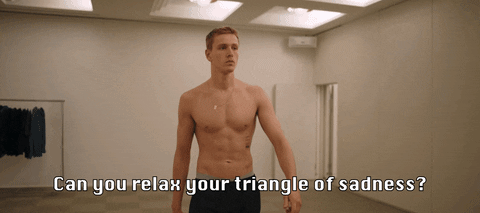
other "split decisions"
- All Quiet on the Western Front - poetic or vacuous?
- Babylon - thrilling or interminable?
- Everything Everywhere All At Once - essential or exhausting?
- The Fabelmans - joyous or phony?
- TÁR - utterly engrossing or underwhelming?
- The Whale - moving or just plain bad?